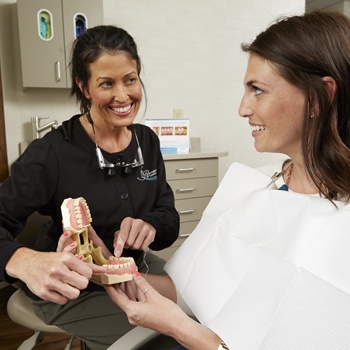Your personal home care plays an important role in achieving that goal. Your personal home care starts by eating balanced meals, reducing the number of snacks you eat, and correctly using the various dental aids that help control the plaque and bacteria that cause dental disease.
Brush your teeth at least twice a day (especially before going to bed at night) with an ADA approved soft bristle brush and toothpaste.
Place the brush at a 45 degree angle to the gums and brush gently using small, circular motions, ensuring that you always feel the bristles on the gums.
 Daily flossing is the best way to clean between the teeth and under the gumline. Flossing not only helps clean these spaces, it disrupts plaque colonies from adhering to teeth, preventing damage to the gums, and bone.
Daily flossing is the best way to clean between the teeth and under the gumline. Flossing not only helps clean these spaces, it disrupts plaque colonies from adhering to teeth, preventing damage to the gums, and bone.
It is important to rinse your mouth with water after brushing, and also after meals if you are unable to brush. If you are using an over-the-counter product for rinsing, it’s a good idea to consult with your dental hygienist to pick the one most suitable for you.
Your hygienist or dentist may recommend other dental aids such as:
All can play an important role in good dental home care.
Regular, preventative care is an affordable choice. Don't wait until it hurts.
735 N. Water Street, Suite 826, Milwaukee, WI 53202 |
Phone: 414-271-1770
Copyright ©2025 Riverwalk Dentistry, SC | All Rights Reserved.
Copyright ©2025
Riverwalk Dentistry, SC
All Rights Reserved